|
|
|
Sort Order |
|
|
|
Items / Page
|
|
|
|
|
|
|
| Srl | Item |
| 1 |
ID:
095018
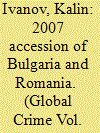

|
|
|
|
|
| Publication |
2010.
|
| Summary/Abstract |
For both objective and subjective reasons, the European Union devoted unprecedented attention to the problem of corruption in Bulgaria and Romania. The European Union (EU) faced a complex challenge in wielding its arsenal of carrots and sticks to encourage reform in the two countries. Conditionality was further complicated by rivalries between Sofia and Bucharest. Despite its limits, EU pressure presented a rare opportunity to depoliticise anti-corruption policy. After accession, Romania regressed from its previous achievements against corruption, and Bulgaria remained reluctant to prosecute senior officials or confront organised crime. Nevertheless, the European Commission continued its monitoring activities, and its ability to freeze funds maintained a modicum of pressure for reform. More effective anti-corruption efforts are possible if a domestic constituency for reform gains sufficient momentum to replace the EU's waning influence.
|
|
|
|
|
|
|
|
|
|
|
|
|
|
|
|
| 2 |
ID:
073744
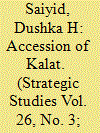

|
|
|
| 3 |
ID:
082259
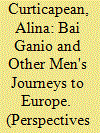

|
|
|
|
|
| Publication |
2008.
|
| Summary/Abstract |
This article examines the role of Balkanism in Bulgarian EU accession discourses
during the period that preceded the country's membership of the EU. It focuses on political
cartoons ? regarded as indicative of broader societal discourses ? which activate the 'journey'
or 'motion' metaphor that dominated the imagery of EU integration. The article was
prompted by a perceived incongruity in the study of the discursive encounter between the
West and the Balkans. While most analysis concentrates on the Western or European self, by
examining EU accession discourses in Bulgaria, this article turns to the Balkans' responses to
Western constructions. The study brings to light a decidedly mixed picture. Even though the
crucial role of Balkanist representations and interpretations in Bulgarian EU accession
discourses cannot be denied, alternative constructions are certainly present. They range
from ambiguity and indifference to more overt challenges to the binary oppositions that
characterize Balkanism.
|
|
|
|
|
|
|
|
|
|
|
|
|
|
|
|
| 4 |
ID:
075668
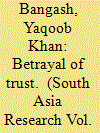

|
|
|
|
|
| Publication |
2006.
|
| Summary/Abstract |
This article analyses why and how the princely order, once considered the bulwark of British rule, came tumbling down so rapidly within a few months in 1947, following the intervention of Lord Mountbatten, a royal cousin, who the princes thought would support them in preserving their rule and privileges. How far were the princes themselves to blame and what role did Mountbatten play? Through a careful re-examination of available sources this article argues that the princes, though unable to act together, trusted the British Crown to protect their rights and interests as promised, but were mistaken in believing that Mountbatten would uphold Britain's treaty obligations regarding the princely states.
|
|
|
|
|
|
|
|
|
|
|
|
|
|
|
|
| 5 |
ID:
074397
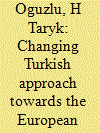

|
|
|
| 6 |
ID:
114563
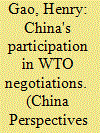

|
|
|
| 7 |
ID:
116056


|
|
|
|
|
| Publication |
2012.
|
| Summary/Abstract |
This article examines the case for Jammu and Kashmir's independence from India as a matter of remedial justice within the context of a moral right to secede premised upon the circumstances of the state's 1947 inclusion within the Indian union. Principles of remedial justice are defended as a suitable basis for adjudicating rival claims to sovereignty and negotiating secessionist disputes. The case for Kashmir's secession as a matter of remedial justice is then investigated with reference to the claims that India attempted to seize the former princely state by force and reneged on the promise of a plebiscite to ratify its sovereignty. This article argues that, while a contractual understanding of these claims might yield a coherent explication of a right to secede, this would not include a right to independent statehood and should be rejected because of the corollary that Dogra rule was morally legitimate. By contrast, the state's right to secede might be justified by reference to the claim that the events of accession violated its inhabitants' rights to popular sovereignty and self-determination. However, while offering a more plausible account of a right of secession, such a justification would not be a specifically remedial one and would fail to include many of the benefits of a remedial right. Consequently, we need to look beyond the historical events surrounding the state's accession as the basis for reconciling competing claims regarding Kashmir's rightful political status within a framework of remedial justice.
|
|
|
|
|
|
|
|
|
|
|
|
|
|
|
|
| 8 |
ID:
074368


|
|
|
|
|
| Publication |
2006.
|
| Summary/Abstract |
Employing the notion of 'rhetorical entrapment', this article offers a discussion of Ukraine's EU membership prospects. It argues that while, for material reasons, the EU may want to keep Ukraine at arm's length, normative commitments made earlier may compel it to offer much more. The study first looks at the domestic situation in Ukraine in light of the country's call for accession talks to be opened in 2007, before it goes on to analyse the distribution of support for and opposition to the Ukrainian membership perspective among the EU member states.
|
|
|
|
|
|
|
|
|
|
|
|
|
|
|
|
| 9 |
ID:
148581
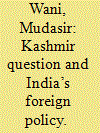

|
|
|
|
|
| Summary/Abstract |
This paper looks into some historical and foundational premonitions that have fashioned the foreign policy of India regarding the contested ‘Kashmir question’. Firstly, it looks at the role of post-independence charismatic political leadership in steering the foreign policy on the Kashmir question. The paper argues within the constructivist framework: how the international environment, the ideology of Indian State (including the ideology of national political parties) and Pakistan’s role remain important factors in determining the foreign policy of India related to Kashmir.
|
|
|
|
|
|
|
|
|
|
|
|
|
|
|
|
| 10 |
ID:
095017
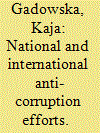

|
|
|
|
|
| Publication |
2010.
|
| Summary/Abstract |
This article's objective is to analyse the influence of international anti-corruption pressure on national measures aimed at combating corruption in Poland. First, the change in perception of corruption in Poland will be addressed, along with a short discussion on attempts to reduce its scope. Second, the anti-corruption measures of international organisations, such as the United Nations, the organisation for economic co-operation and development (OECD), the Council of Europe, Group of States against Corruption and the European Union, as well as international Conventions adopted and ratified by Poland will be examined. Third, the role of state and non-governmental institutions involved in the fight against corruption in Poland will be reviewed. Finally, the process of implementing governmental anti-corruption strategies will be analysed, with a particular focus on the introduction of legislative changes that are aimed at limiting corruption through the processes of legal modernisation and harmonisation. This article argues that from among the many initiatives undertaken by various international institutions combating corruption in Poland, the most effective was found to be pressure exerted by the European Union. Poland's eagerness to enter the European Union, and to make use of structural funds after accession, forced the country's elected governments to implement certain recommendations of the European Commission regarding anti-corruption policy. However, these activities had, to a certain degree, a facade-like character and were addressed to fulfil the formal requirements of the European Commission instead of serving as a genuine effort to curb corruption. Even though corruption has been officially considered a serious social problem, which needs to be combated and many anti-corruption measures have been implemented, the effects of the actions undertaken by consecutive Polish governments are not fully satisfactory. Also, anti-corruption slogans have been instrumentally used to fight against political opponents. From another perspective, the activities of Polish non-governmental organisations have contributed to a visible reduction in social tolerance for corruption. Although public opinion research shows that the level of corruption is slowly decreasing in Poland and the country's position in the Corruption Perception Index is systematically improving, it is uncertain how strongly rooted this positive tendency will find itself in the long term.
|
|
|
|
|
|
|
|
|
|
|
|
|
|
|
|
| 11 |
ID:
073680
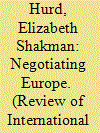

|
|
|
|
|
| Publication |
2006.
|
| Summary/Abstract |
This article examines the cultural basis of European opposition to Turkish accession to the European Union (EU). Most observers depict the cultural and religious dimensions of the European debate over Turkish accession as a disagreement between those who see Europe as a Christian 'club' and those open to a more religiously pluralistic European identity. However, polls suggest that cultural and religiously based doubts about Turkish accession resonate with a much larger proportion of the European population than those who publicly defend the idea of an exclusivist 'Christian' Europe. Both secularists and Christian exclusivists ('traditionalists') express hesitations about Turkish membership:
|
|
|
|
|
|
|
|
|
|
|
|
|
|
|
|
| 12 |
ID:
181614
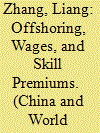

|
|
|
|
|
| Summary/Abstract |
Using detailed Chinese manufacturing firm production and trade data from 2000 to 2006, this study finds that offshoring significantly increases firms’ average wages. First, using the quasi-natural experiment of China's accession to the World Trade Organization, we investigate how a reduction in offshoring costs affects the manufacturing firm's wages and find that a productivity effect and a job-relocation effect are two possible channels. Second, the dynamic decomposition of industry-level wages indicates that the within-firm effect is 0.547, accounting for 31.5 percent of the total variation. Finally, a Mincer-type regression shows that offshoring also increases within-firm skill premiums. Our findings have strong implications for the government related to framing appropriate industrial policies to raise wages and reduce income inequality.
|
|
|
|
|
|
|
|
|
|
|
|
|
|
|
|
| 13 |
ID:
122925
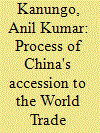

|
|
|
|
|
| Publication |
2011.
|
| Summary/Abstract |
The process of China's accession to the World Trade Organization (WTO) is considered to be one of the toughest challenges faced by any country. Denied the status of a developing economy because of pressure from the US, the European Union and Japan, it has had to make commitments to cut tariffs and open its markets. China has been slow in abiding by its commitment with considerations of national sovereignty and security taking precedence over the issue of allowing greater access to the Chinese market and greater trade liberalization. Thus, the country's sovereignty and security were considered more important than consumer satisfaction, development of telecommunications network, innovation and, to a large extent, its services sector.
|
|
|
|
|
|
|
|
|
|
|
|
|
|
|
|
|
|
|
|
|